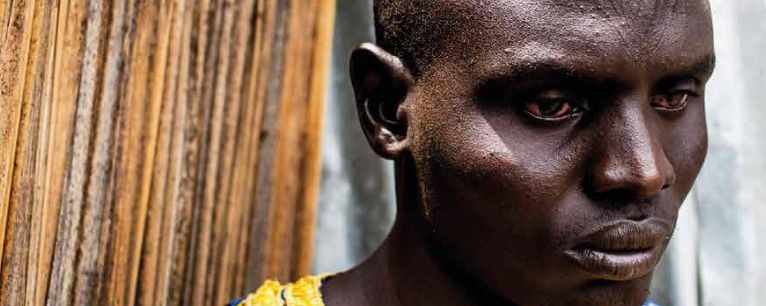When the news of the outbreak of conflict in Juba spread to Uror in Jonglei State on 16 December, Akol Kuol, a Dinka cattle trader, found himself alone deep in the heart of Nuer territory, facing growing hostility and very far from home.
Akol, age 34, lost to thieves the herd of cattle he had come to trade. Two of his Dinka companions were killed, he was told.
But his own life was saved. Akol describes how a Nuer friend helped him escape the town for the bush. He walked for three days and two nights without sleep to reach his home in Malakal and be reunited with his family.
Akol Kuol: ‘The thought of my wife and child was the only thing that kept me going’
We expected people to die in the previous war. Why not? We were at war and people die during wars. We were prepared for that. This time we were caught by surprise and were not even a little prepared.
We had time to experience peace. We had grown to know each other and were bonding on many different levels. We had accepted each other, embraced our differences and made friends with people from different corners of South Sudan. It was very good for the people of South Sudan and also very good for business. We were just getting used to living in peace.
I am in the business of rearing and trading cattle. I am based in Malakal but was in Uror conducting some business when the fighting broke out in December. It is a Nuer area and many people knew that I was a Dinka as I had travelled regularly for trade. My tribe had never been an issue. It had never even crossed my mind.
I was not following the events in Juba and did not expect anything but normal business to be conducted on that day. This time, I had travelled with 25 cows and as is the practice, I paid some young Nuer men to take them out, for grazing while I rested and talked to some of my old friends. I was relaxed and having a good time. Little did I know what was happening in the fields to my cattle!
The first person to hear about the raids was my friend Ruei. He told us that while the young men were in the field with my 25 cows, they were confronted by a group of Nuer men asking where I was. They already knew that the cattle belonged to me. The young men said they did not know. The group then forcibly rounded up all the cows and left.
We talked about the events in Juba and wondered if they could have escalated to the point where people and their property were not safe. I had come to Uror with two of my Dinka friends and asked about their whereabouts. I was told that they had died.
Ruei then said that if they had raided my cattle and asked about me, they would soon return. He ran with me to the edge of the forest and told me to wait there for him while he went and collected my bags. I waited, not sure if he would come back, but he did. He gave me my bags and wished me well and I begun what I assumed would be a very long journey.
I have Dinka traditional marks on my face. I was afraid that someone would spot them and see me as a target so I wore a hat to cover them. My main aim was to get to Malakal and see if my wife and child were safe, as the fighting was going to reach them eventually.
This thought was the only thing giving me motivation as I walked in Nuer lands, hiding my identity as a Dinka. I can speak the language and kept a low profile so no one suspected that I was a Dinka.
This journey normally takes seven days with cattle. This time, it took three days and two nights. I was walking as fast as I could and did not sleep. I only rested when I felt that my body could go on no longer. I had some biscuits in my bag and that kept me going. It had been raiding so there was water to drink from streams and rivers. It was not an easy journey but I had no choice but to make it.
I reached Malakal and found my family. After knowing they were safe, I finally allowed myself to rest.
I have lost all my investments and almost lost my life.
I am very bitter about what has happened in South Sudan but I am grateful to be alive and that my family is safe. I would not be speaking to you now if it was not for Ruei.
This text is part of a collection of personal testimonies published by the organization Oxfam, and is reproduced here as part of a series of survivor accounts to be published by Radio Tamazuj. If you or someone you know has a story to tell, please contact us.
Related:
Stories of hope and survival: Nyabil Riel
Stories of hope and survival: Makuey Chol Bol




